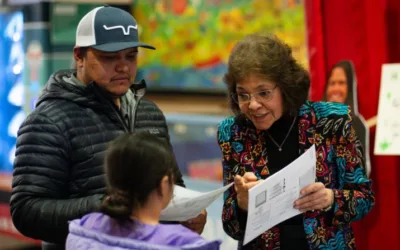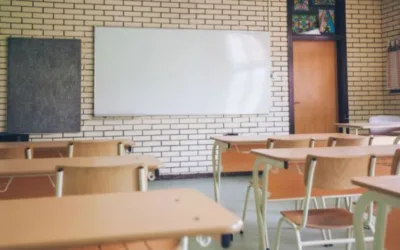With Covid 19 cases surging in the valley, Teton County School District shifted to online-only classes for the last two weeks in November. But that date may be extended, depending on health orders and community spread. Michelle Rooks, a 26-year veteran educator who currently teaches 6th grade at the Jackson Hole Middle School, spoke about her experiences as a teacher during COVID-19. Michelle is also a parent, so she and her daughter have been at home doing school at the same time.
ROOKS: Well, every time I say this in public, I have to preface this with all of the privilege that I experience. So we have space to have our own rooms. I have one child who’s in high school and who loves school and has never really been difficult for us as far as parenting somebody in school. And no one is sick. So, for me, it has been very smooth. I know that that’s not the case with everyone.
DALY: What are some challenges you’re hearing from other families?
ROOKS: There are space challenges. We are reading books in both of my classes, so we’re reading books together. And so we kind of take turns at parts. So different people read the dialogue, different people are narrators to hear lots of voices. And you can hear in the background teachers blaring in, you know, where they have lots of different kids [online at the same time]. And so it’s not quiet and peaceful. I think of what we take for granted. We have this schedule laid out and kids are like, ‘What time is it?” I’ll have kids showing up at third period, and I’m like, “Oh, Nugget, first period starts at nine.” “How do I know that?” So just the idea that you can tell time, that’s a challenge for some kids that are at the lower ages. This little boy yesterday was late to class and I said, “Why are you late? Why were you late today?” And he’s like, “Did you see the sun? It was beautiful.” And he went for a walk. I mean, how do you get mad at that?
DALY: That really encapsulates how learning is different now.
ROOKS: One of the things I was just thinking about is how we are stuck in our schedule that is centuries old. That your learning starts at 12:02 AM. And he’s like, “But the sun is shining.” How do we break out of this? I think this is just giving us this kind of cool opportunity to break out of some of these cages we’re trapped in.
DALY: I really love that perspective, Michelle. When we spoke the other day, you had mentioned it’s good to adjust our expectations. I wonder if you could elaborate on that.
ROOKS: So when we were getting ready to go on Thursday, I said to the kids, “Please don’t ghost me! Show up for class.” All of a sudden I had this moment. I was like, “You guys, this is going to be how school is probably going to be for a couple of years.” And they were like, “A couple of years!” We’re not going to solve COVID right away. And if we adjust our thinking to: I’ve got to get good at this online school thing, I might need to learn how to tell time or I might need to figure out how to do this in a way that my family can coexist. I think that that would serve us right now. I think we’re going to be in and out of school for a little while and we can’t always be shocked by it.
DALY: You discovered last spring when everything had to shift suddenly to online that some of your kids actually did better online. Is that holding true? Are you still seeing that?
ROOKS: Last year we had classes of 28, 30 kids. So you couldn’t hear every single voice, but you could see everyone’s chat. And they love that. They would chat and they would say these unbelievable things. I think too, when kids were disruptive or if they were off topic or if they were inappropriate, teachers had this ability to mute them. And we were laughing, “If we go back to school, how do you mute those kids?.” You know, you just can’t. The other kids didn’t have to hear that interaction and it just felt more peaceful. And in fact, we started in hybrid, as you know, and we went from an average of eight discipline referrals a day to eight total. To November, we have had eight discipline referrals total. And so just we asked the kids, “Do you guys notice that it’s calmer and more peaceful?’ And they were like, “Yeah.”
It’s been really challenging me to think about how stuck we are in this century-old system. And where are some cracks where we could make it a tiny bit more humane? Just really recognizing the pace at which we are pushing ourselves. I feel like if COVID has taught us anything, it’s that life will keep going if we slow down. Even if we all stayed at home, life would keep turning, right?
DALY: Thank you so much for talking to me today.
ROOKS: Thank you. Thank you for asking me.





